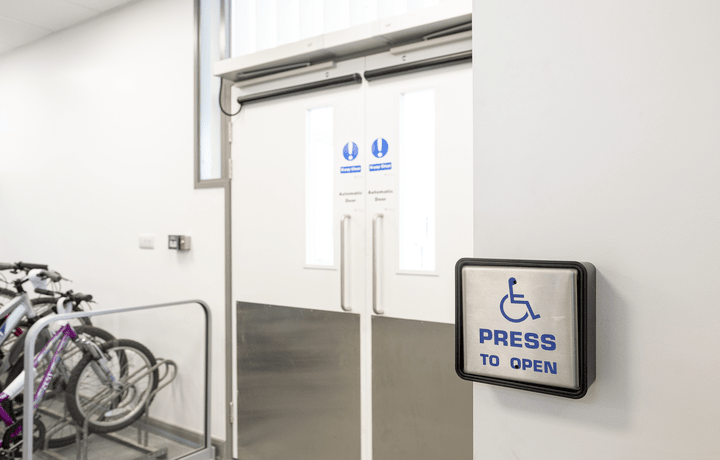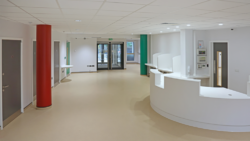Inclusive Design Starts at the Door
Inclusive design isn’t just about meeting the needs of people with disabilities, it’s about creating spaces that work better for everyone.
One of the key parts of inclusive design is making sure the doors we use every day are easy to use, safe, and accessible for everyone. Disability-friendly doors aren’t just helpful for people with specific needs – they actually improve the experience for everyone. This is especially true for automatic and custom-made doors, which can make a building feel more welcoming, efficient, and easier to navigate.
In this blog post, we’ll take a look at the legal side of disability-friendly doors in the UK, explain how they benefit all users (not just those with additional needs), and explore the custom options that Lloyd Worrall offers.
The legal requirements for disability-friendly doors in the UK
In the UK, making sure designs are inclusive and accessible isn’t just a good idea – it’s actually required by law. One of the key pieces of legislation is the Equality Act 2010, which guarantees access for everyone, including people with disabilities. This law makes sure people aren’t discriminated against and requires businesses and employers to make reasonable adjustments to accommodate disabled individuals. When it comes to doors, this means making sure entrances are easy to use, such as using automatic openers, having wider doorways, and lower thresholds.
For instance, Approved Document M (Access to and Use of Buildings) lays out specific rules for accessibility in public and commercial buildings. These guidelines cover door widths, thresholds, handles, and how much force is needed to open them – all of which need to be followed to stay within the law. By making sure doors are accessible, businesses and public spaces avoid legal issues and create environments that are welcoming to everyone.
How disability-friendly doors improve usability for everyone
Disability-friendly doors are designed to help people with mobility challenges, but the great thing is, these features benefit everyone. Automatic doors, for example, make life easier for anyone carrying heavy bags, parents with prams, or anyone with their hands full. Similarly, low thresholds aren’t just helpful for wheelchair users or those with walking aids – they also make it easier for cyclists, people with luggage, or anyone who’d otherwise struggle to lift something heavy to get through.
Bigger door widths, non-slip surfaces, and easy-to-use handles are all features that make doors easier for everyone to navigate. These small adjustments reduce the effort it takes to enter or exit a building, making the whole experience smoother and more convenient. In busy places like schools, offices, or hospitals, automatic doors also help speed up the flow of people and improve the overall experience for all users, not just those with disabilities.
On top of that, making buildings accessible for everyone also boosts safety. Automatic doors with sensors can prevent accidents, like someone struggling to open a heavy door in a rush or tripping over a threshold. These smart solutions not only make spaces safer but can also save on maintenance costs by reducing the risk of door damage over time.
Bespoke disability-friendly doors from Lloyd Worrall
At Lloyd Worrall, we’re dedicated to meeting the unique needs of our clients while ensuring everything is fully compliant with accessibility standards. We offer a variety of door solutions and accessibility products that can be integrated with your current solutions or installed in fresh spaces.
Door automation systems offer a variety of options, including automatic sliding doors, swing doors, and bi-fold doors, all designed to improve accessibility. These doors feature advanced technology, like sensors and motion detectors, that allow them to open and close automatically, making it easier for everyone to enter and exit a building. And, because these systems are highly customisable, they can be designed to fit the specific needs and style of any space, from small offices to large commercial buildings.
Working alongside door automation, we offer:
Wide doorways
We offer doorsets specifically designed for wider doorways to ensure easy access for wheelchair users and those with mobility aids. These doorsets are built to provide ample space, allowing for smooth passage of wheelchairs, scooters, and other accessibility equipment.
Swing door activation
These features are essential for creating a safer, hands-free entry, particularly in high-traffic areas. With the use of motion sensors, safety sensors, and a variety of activation options, swing doors make a huge difference to accessibility.
Finger protection
Retractable high-performance guards and heavy-duty rubber finger protection guards are designed to prevent accidents and injuries, helping to keep spaces safer for everyone.
Touch-free push pads
Touch-free activation pads make life easier for people with disabilities, but they also benefit anyone carrying packages or trying to avoid touching public surfaces. Options such as narrow-style push pads with a disabled logo offer accessible solutions for a variety of needs.
Remote control key fob
This handy feature allows users with limited mobility to operate doors from a distance, improving accessibility and making it more convenient for everyone.
Automatic door signs & wheelchair logo signs
Clear signage is key in guiding users to accessible entrances.
Battery backup
A battery backup is essential for ensuring that accessibility features remain working even during power outages or heavy use.
Prioritising accessibility with Lloyd Worrall
By working with Lloyd Worrall to create a more inclusive space for everyone, you’re ensuring that your building is not only accessible but also efficient, secure, and aligned with the latest regulations.
Get in touch today to speak to your local branch about solutions built for you.
Back To News





